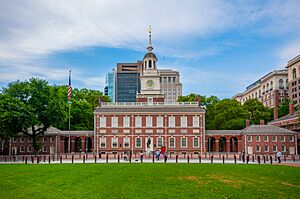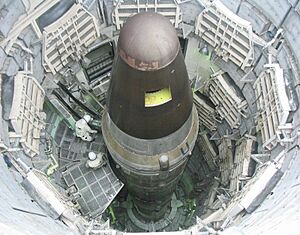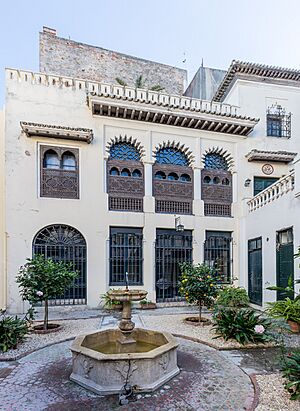National Historic Landmark facts for kids
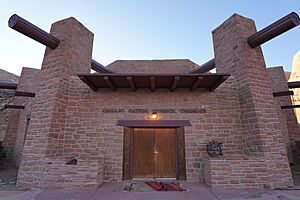
A National Historic Landmark (NHL) is a special place in the United States. It could be a building, a whole area, an object, or a historical site. The U.S. government officially recognizes these places. They are chosen because they have amazing historical importance.
Only about 2,500 places are NHLs. This is a very small number, just three percent of all the places listed on the National Register of Historic Places (NRHP). Being an NHL means a place is truly special to American history.
Sometimes, a large area is named a National Historic Landmark District. This district can include many buildings, structures, or sites that help tell its story. Some of these individual places might also be famous on their own.
Contents
Discovering America's Past: The History of NHLs
The idea of marking important places started a long time ago. The very first place recognized in this way was a simple cedar post. It was placed by the Lewis and Clark Expedition in 1804. They put it there to remember Sergeant Charles Floyd, who passed away during their journey.
The First Official Landmark
That cedar post was later replaced by a tall marble monument. This monument, the Sergeant Floyd Monument in Sioux City, Iowa, became an official NHL on June 30, 1960. It was one of the first places to get this special title.
Laws to Protect History
Before 1935, people tried to save important historical places in different ways. Then, in 1935, a new law called the Historic Sites Act was passed. This law allowed the Secretary of the Interior to find and organize historic properties. It also gave the National Park Service the job of taking care of these important places.
Over many years, groups like the Historic American Buildings Survey collected information. They learned about buildings and sites that were important for their culture or design. This work helped create the Historic Sites Survey program.
How the Program Grew
Many places recognized under the 1935 law became National Historic Sites. The first one was the Salem Maritime National Historic Site in Massachusetts, designated on March 17, 1938.
In 1960, the National Park Service started managing all the survey information. This is when the National Historic Landmark program really began to take shape. When the National Register of Historic Places was created in 1966, the NHL program became part of it. This made the rules for choosing and naming landmarks much clearer.
In 1980, the rules changed again. Now, owners of a property must agree before it can be named an NHL. This helps make sure everyone is happy with the designation. On October 9, 1960, 92 places were announced as eligible to be NHLs. All of them are now officially recognized from that date.
What Makes a Place a National Historic Landmark?
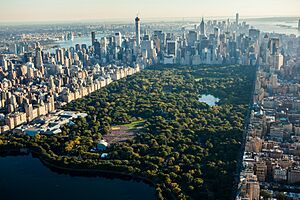
The Secretary of the Interior chooses NHLs based on specific reasons. These places are truly special because they are:
- Sites where important national historical events happened.
- Places where famous people lived or worked.
- Symbols of big ideas that helped shape the nation.
- Amazing examples of design or how things were built.
- Places that show a unique way of life from the past.
- Archeological sites that can teach us a lot about history.
Where Are These Landmarks?
Today, there are over 2,500 NHLs. Most of them are in the United States, but some are in other places too! You can find NHLs in all 50 states and in Washington, D.C..
Some states have many more NHLs than others. Pennsylvania, Massachusetts, and New York together have almost a quarter of all NHLs. Cities like Philadelphia, Boston, and New York City each have more NHLs than most entire states! New York City alone has more NHLs than all but five states.
Landmarks Beyond the U.S.
NHLs are not just found within the 50 states. There are 15 in U.S. territories like Puerto Rico and the Virgin Islands. Five more are in countries that are associated with the U.S., such as Micronesia. There is even one NHL in Morocco, called the American Legation in Tangier.
Over 100 ships or shipwrecks have also been named NHLs. These include famous vessels and important underwater sites.
Who Cares for Them?
About half of all National Historic Landmarks are owned by private citizens or groups. The National Park Service helps suggest new landmarks and works to keep them in good condition. There is also a group called the National Historic Landmark Stewards Association. This group helps owners and managers protect and promote these important places.
When a place becomes an NHL, it is also automatically added to the National Register of Historic Places. Only about three percent of all places on the Register are NHLs, showing how special they are.
There are a few very famous exceptions to this rule in Washington, D.C.. The White House, the United States Capitol, and the United States Supreme Court Building are all NHLs. However, they are not listed on the National Register.
See also
 In Spanish: Hito Histórico Nacional (Estados Unidos) para niños
In Spanish: Hito Histórico Nacional (Estados Unidos) para niños
- American Water Landmark
- Listed building, a similar designation in the UK
- List of churches that are National Historic Landmarks in the United States
- List of U.S. National Historic Landmark ships, shipwrecks, and shipyards
- List of U.S. National Historic Landmarks by state
- National Historic Sites, Events, and Persons, similar designations in Canada
- National Natural Landmark
- United States memorials
- United States National Register of Historic Places listings


